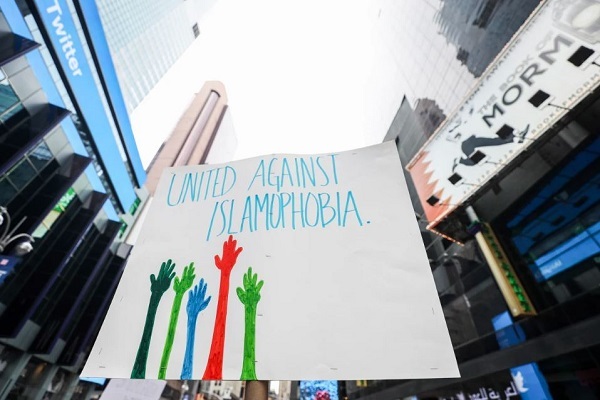Anti-Muslim Hate Incident Up 182% amid Gaza Onslaught: Rights Group

The Council on American-Islamic Relations (CAIR) said that it received 774 requests for help and reports of bias incidents from Muslims across the U.S. from Oct. 7 to Oct. 24, a 182% jump from any given 16-day stretch last year. For comparison, during a 16-day period in 2022, it received an average of 274 complaints, NBC News reported.
“We’re working seven days a week, around the clock, fielding incoming complaints,” said Corey Saylor, CAIR’s research and advocacy director. “I’ve only ever seen that twice in my career: right after 9/11 and in December 2015 after that announcement by Trump of his plan to ban Muslims from the country.”
Palestinian officials have said that more than 8,500 people have been killed in the Gaza Strip and that over 21,000 have been injured in Israeli airstrikes in the past 25 days.
Bias incidents range from verbal harassment to physical violence, the CAIR report said. Saylor said that the incidents are sometimes to law enforcement but that in many cases complainants don’t trust the police enough to move forward.
The spike in reports of Islamophobic incidents, in addition to violence against Muslim Americans, has put the community on edge.
Similar to what happened following 9/11
As a Palestinian American, Laila El-Haddad, 45, feels like she’s fighting a battle on two fronts. She’s filled with fear for her family in Gaza, now facing an uncertain future without a way to contact her. But as a Muslim living in the U.S., she’s also dealing with some of the most rampant Islamophobia of her lifetime, she said.
“I personally have been through this — I was 21 or 22 in Boston when 9/11 happened,” she said. “This feels like that, but almost a more dystopian version of that.”
El-Haddad, a vocal advocate for Palestinian rights, said she has faced harassment, online threats and even a letter sent to her home address calling for all Gazans to be killed.
Read More:
“For Palestinians and, more generally, Arabs and anyone who looks to be from that part of the world, this isn’t a new thing,” El-Haddad said. “We’ve always been demonized.”
Now, as a U.S. citizen of six years and a mom, she’s having to teach her children how to keep themselves safe in the face of a new wave of Islamophobia, too, she said.
“I just tell my daughter not to engage or respond,” she said, noting that her 15-year-old also wears a hijab. “There’s this heightened fear, obviously.”
Hijabi women and girls are easily identifiable as Muslim, making them particularly vulnerable to Islamophobia.
“Using dehumanizing language has deadly consequences, often not only for Palestinians there in Gaza, but for any person of color here, a Muslim or not,” she said.
Read More:
Other moms in El-Haddad’s circle are keeping pepper spray on them and taking more precautions moving through the world, she said. She worries that misinformation and language that conflates Muslims with terrorists will have dire impacts on brown people in the U.S. and beyond.
Muslims aren’t only ones at risk from Islamophobia
Ali Awad, an Atlanta-based attorney, is no stranger to Islamophobia. He was in the fifth grade during the 9/11 attacks in 2001.
“All the teachers in the school, everyone, turned the TVs on, and all the kids were watching,” said Awad, 32. “And this one kid named Josh just yelled at me, ‘Hey, why is your family killing us?’ in front of the whole class.”
Awad, who is Palestinian American and grew up in a conservative Christian community in Georgia, said that was one of many instances that left him feeling isolated because of his faith. These past few weeks, he has been called a terrorist online for speaking in solidarity with his Palestinian heritage and physically threatened by a fellow attorney who said, “I’m going to hunt you down.” Awad reported him to the State Bar of Georgia.
But actual Muslims aren’t the only ones at risk from Islamophobia, Awad said. Anyone perceived to be Muslim, including Arabs who belong to other faith groups, and Sikhs, may also be targeted by Islamophobes.
Few other Islamophobic incidents
On Thursday afternoon, a Maryland woman who wears the hijab was in her car with her child at a stop light when a woman called her a Muslim slur and flashed the middle finger, NBC Washington reported. The situation escalated when the victim began recording the incident and the woman began banging on the hood of the car and the passenger-side window.
Read More:
In New York, a man called a teenage girl a terrorist and pulled on her hijab while she was on the subway to school, NBC New York reported.
Undercount
Zainab Chaudry, the director of CAIR’s office in Maryland, said she believes the reports the organization has received are an undercount.
“There’s a very real sense of fear within our communities about the implications of these kinds of incidents and the consequences of reporting and coming forward to demand justice,” she said. “There’s a fear of consequences, of backlash, of intimidation, harassment, further perpetuation of the aggressions against the victim.”
Chaudry emphasized the importance of law enforcement agencies’ investigating such incidents thoroughly and elected officials’ calling out Islamophobia in their communities the same way they would call out other forms of hate.
‘I Feel betrayed’
Executive Director Nihad Awad says the recent wave of Islamophobia has left him feeling dehumanized as a Muslim and a Palestinian.
“I feel backstabbed and betrayed,” he said. “But the racism? I grew up with that. I’m used to it.”
Read More"
One positive in the current climate compared to the past, Awad said, is social media.
“What we have now is our social media and our voice, which we didn’t have in 2001,” he said. “So now we can actually broadcast what’s happening.”
Source: NBC News



